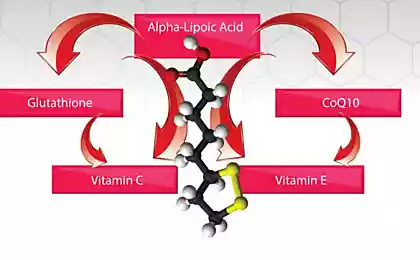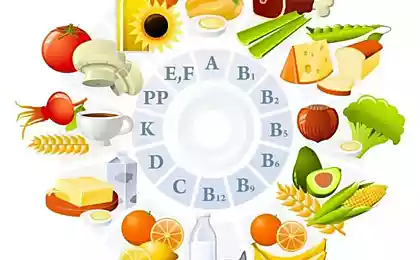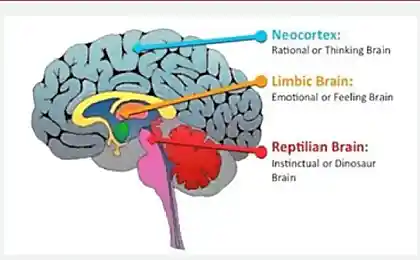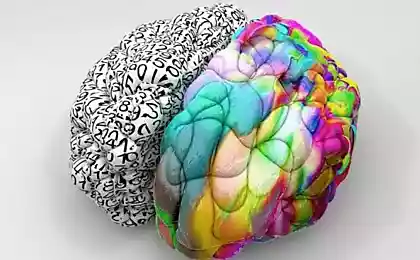1706
Vitamin b for the health of your brain
It is well known that healthy fats, such as omega-3 fats of animal origin are very important for brain health, but for optimal performance of the brain also need other nutrients, such as vitamins.
B vitamins, especially folate (B9 or folic acid in synthetic form) and vitamins B6 and B12 play a critical role in the prevention of cognitive impairment and more severe dementia, in particular Alzheimer's disease.
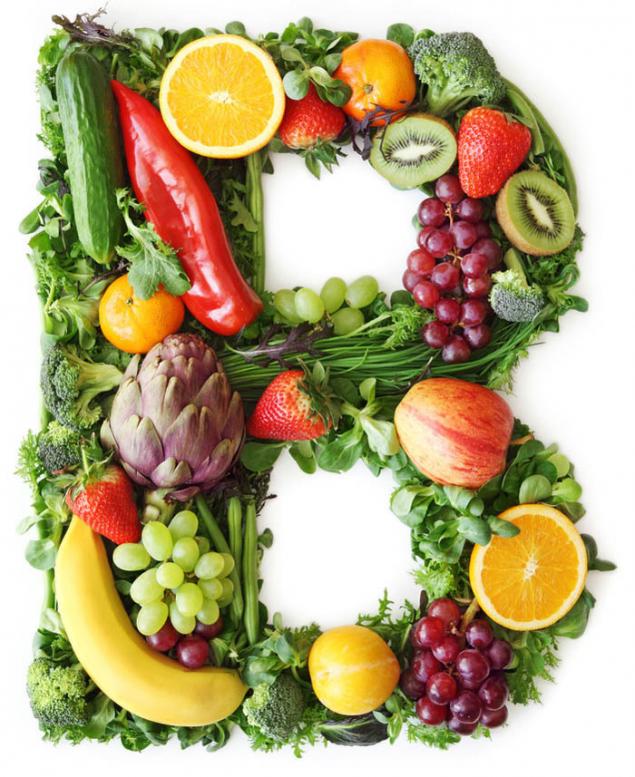
Cognitive dysfunction and memory problems are the basic signs of lack of vitamin B12, indicating its indispensable role for brain health.
B vitamins and omega-3 is an important combination for brain healthLow plasma concentrations of omega-3 and high levels of the amino acid homocysteine lead to brain atrophy, dementia and Alzheimer's disease. Vitamins B6, B9 and B12 help convert homocysteine to methionine is a building block for proteins.
If you are not getting enough B vitamins, the conversion process is broken, and your level of homocysteine increases. Conversely, by increasing the consumption of folic acid (folate), vitamins B6 and B12 will lower homocysteine levels.
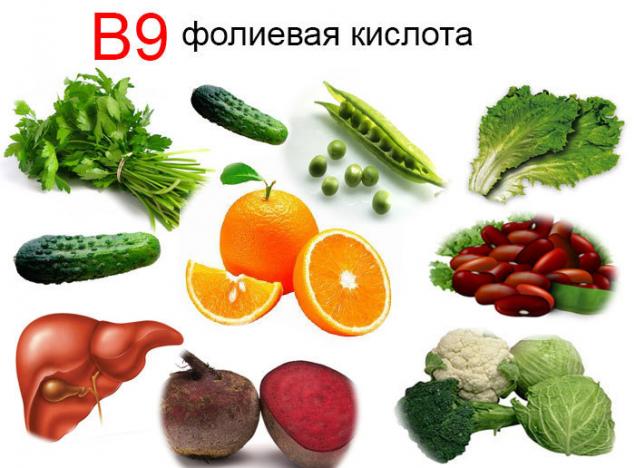
In one placebo-controlled study, the results of which were published in 2015, 168 elderly people with mild cognitive impairment were randomly assigned to either receive placebo or a daily intake of 0.8 mg folic acid, 20 mg vitamin B6 and 0.5 mg vitamin B12 in Supplement form.
It should be noted that this is a fairly high dose — much higher rekomenduemyj consumption rates of the United States. For all participants was performed magnetic resonance imaging (MRI) of the skull in the beginning of the study and after its completion two years later.
Analyzed the effect of vitamins B and were compared to the levels of fatty acids omega-3 before and after studies.Interestingly, the positive effect of B vitamins was recorded only in patients with high levels of omega-3.
Vitamins Sushestvenno slow shrinkage of the brainElevated homocysteine causes brain degeneration, and vitamins is known to reduce levels of homocysteine.
A 2010 study in which participants were again given higher than standard doses of vitamin b, also found that patients who took B vitamins had significantly less brain shrinkage than those in the placebo group.
The participants received a placebo or 800 micrograms (mcg) of folic acid, 500 mcg vitamin B12 and 20 mg vitamin B6. The study was based on the assumption that by controlling levels of homocysteine may reduce the shrinkage of the brain, thereby slowing the development of Alzheimer's disease.
Indeed, after two years in patients who took B vitamins had significantly less brain shrinkage compared with the group placebo. Patients with the highest homocysteine levels at the beginning of the study, the shrinkage of the brain was two times lower, than those who took a placebo.
Studies show that B vitamins significantly slows Alzheimer's diseasemoreover, the results of the study of 2013 show that vitamin B is not just slow shrinkage of the brain, and doing it in such areas most affected by Alzheimer's disease. I should add that in these particular areas, the shrinkage is reduced as much as seven times!
A brain scan shows the difference of the effect of placebo and vitamins on brain atrophy. As in the study mentioned above, participants who took high doses of folic acid and vitamins B6 and B12 decreased homocysteine levels in the blood and brain shrinkage was reduced by 90%.
As the authors note, "... B vitamins lower homocysteine, which directly leads to a reduction of grey matter atrophy, thereby slowing cognitive impairment.
Our results show that supplements of vitamin B could slow the atrophy of specific areas of the brain that are very important for the development of Alzheimer's disease and associated with cognitive impairment".
Consumption of foods rich in vitamin B12, reduces the risk of developing Alzheimer's disease in elderly vozrastanie useful was a small study of Finnish scientists, published in 2010, It is revealed that consumption of foods rich in vitamin B12, reduces the risk of developing Alzheimer's disease in old age.
The increase in the marker of vitamin B12 (holotranscobalamin) by one unit reduces the risk of developing Alzheimer's by 2%. This is a strong argument for inclusion in the diet of a large number of products with vitamin B: meat, poultry, eggs, dairy products and wild fish.
Leafy green vegetables, beans and peas also provide some B vitamins, but if you follow a vegetarian or vegan diet, you significantly increase the risk of vitamin B12 normally found in foods of animal origin, including meat, fish, eggs, milk and dairy products.
In this case, it is very important vitamin supplements. Another problem is the ability of your body to adequately absorb B12. This is the largest known molecule vitamin, and because of its huge size it is not always easy to digest.
That is why many, if not most oral B12 supplements have no effect. To vitamin B12 needs to bind to stomach protein called intrinsic factor, which promotes absorption of the vitamin in the final part of the small intestine (terminal ileum). The first intrinsic factor is absorbed and drags the attached B12 molecule.
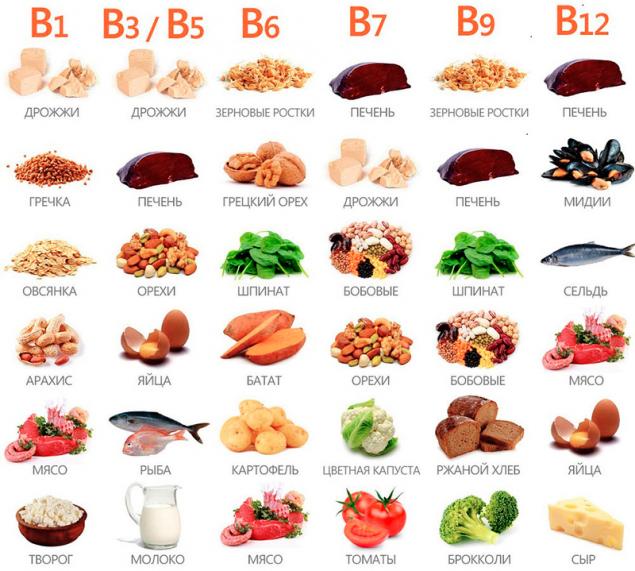
With age, the ability to produce intrinsic factor decreases, thereby increasing the risk of developing a B12 deficiency. Interfere with the absorption of B12 also taking Metformin (Glucophage, Glucophage XR, Fortamet, Riomet, and Glumetza), especially in high doses. Drinking four or more cups of coffee a day can reduce the reserves of vitamin B by as much as 15%; interfere with the absorption of vitamin B12 and taking antacids.
Other useful vitamins for the brainin Addition to B vitamins for optimal brainimportant vitamins C and D. Vitamin C plays an important role in the production of neurotransmitters, including possessing antidepressant properties of serotonin. It is also proven that vitamin C improves intelligence, improves memory and protects against age-related degeneration of the brain and strokes.
In one study, combination of vitamins C and E (in synergy) has helped to reduce the risk of dementia by 60%. Vitamin C also has detoxifying properties and its ability to cross the blood brain barrier it helps to remove from the brain of heavy metals.
Vitamin D — a steroid hormone produced in the skin in response to sun exposure — also severely affects your brain. Pregnant women should always remember this: lack of vitamin D during pregnancy can harm the development of the fetal brain, and cause a number of other problems. Immediately after birth babies need vitamin D for the further development of the brain, and in adulthood the optimum level of vitamins to prevent cognitive impairment.
Where to find valuable nutrients for the brainIn cognitive disorders there is nothing "normal". Most often, they are associated with unhealthy lifestyle, starting with diet with lack of nutrients and plenty of sugar, "non-plant" carbs, unhealthy fats (eg. TRANS fats) and excessive amount of toxins (pesticides and artificial additives, etc.).
To avoid exposure to toxic pesticides, I recommend eating natural foods, ideally organic, grown in the region of residence. However, depending on your specific situation and condition, you may need one or more additives.
For starters, check out the following lists of products containing nutrients for the brain, described in this article: omega-3 of animal origin, vitamins B6, B9, and B12, C, and D. If you find that rarely or never eat foods rich these nutrients, you should think about receiving a high quality Supplement, ideally food. I have prepared special guidelines for choosing supplements.
Nutrient Product source
Recommendations on Supplement
Omega-3 of animal origin
Fatty fish with low mercury content, eg. wild Alaskan salmon, sardines and anchovies, as well as organic meat cow, translated into pasture.
Sardines, in particular, are one of the most concentrated sources of omega-3 fats: one serving contains more than 50% of the RDA.
An adequate alternative is Antarctic krill oil. An additional advantage is the natural content of astaxanthin to prevent oxidation.
Another good option is oil of wild Alaskan salmon.
Vitamin B6
Turkey, beef, chicken, wild salmon, sweet potatoes, potatoes, sunflower seeds, pistachios, avocado, spinach and banana.
An excellent source of B vitamins, especially B6, is nutritional yeast. One serving (2 tablespoons) contains about 10 mg of vitamin B6.
Not to be confused with brewer's yeast and other active yeast: nutritional yeast derived from an organism grown on molasses, which is then collected and dried to deactivate the yeast.
They have a nice cheese flavor and can be added to various dishes. For more information, see this article about vegan diet.
Folate (B9)
Fresh, raw and organic leafy green vegetables, especially broccoli, asparagus, spinach, turnips and greens, legumes (especially lentils): Pinto beans, garbanzo beans, Navy and black beans and kidney beans.
Folic acid — a synthetic type of B vitamin used in supplements; folate in its natural form is contained in food products.
Think about it: the word "folate" comes from "foliage" (edible greenery).
To folic acid could be applied in food, it must first be activated into biologically active form — L-5-MTHF.
This form is able to cross the blood-brain barrier and to bring the above benefits for your brain.
Almost half of the population have difficulty in converting folic acid to a biologically active form from genetically reduced enzymatic activity.
So if you want to take a Supplement with vitamin B, make sure they contain natural folate, not synthetic folic acid.
An excellent source of vitamin a is nutritional yeast.
Vitamin B12
Vitamin B12 found only in animal tissues, including beef and beef liver, lamb, snapper, venison, salmon, shrimp, scallops, poultry, eggs and dairy products.
The few plant foods that contain vitamin B12 are actually B12 analogs that prevent the absorption of this vitamin B12.
It is also recommended to limit the intake of sugars and fermented foods.
When healthy gut flora it produces the whole group of vitamins B.
The consumption of whole foods, ideally organic, along with dairy products, guarantees for your microbiomes of the important fibre and friendly bacteria that optimize internal production of b vitamins.
Nutritional yeast is also rich in B12 and is highly recommended for vegetarians and vegans.
One serving (2 tablespoons) contains about 8 micrograms (mcg) of vitamin B12.
Also effective sublingual (under the tongue), the injection of a fine spray and injections of vitamin B12 because they provide the absorption of large molecules of B12 directly into the bloodstream.
Vitamin C
Sweet pepper, chili pepper, Brussels sprouts, broccoli, artichoke, sweet potato, tomatoes, cauliflower, Kale, papaya, strawberries, oranges, kiwi, grapefruit, melon, lemon.
To increase the consumption of fruits and vegetables, you can go for fresh-squeezed vegetable juices. Alternatively, you can prepare pickled vegetables at home.
The amount of vitamin C in sauerkraut is about six times more than in the same amount of fresh cabbage, so it's a great way to increase the intake of vitamin C.
The most effective form of oral vitamin C is with liposomal vitamin C.
It does not have many side effects, typical vitamin C or ascorbic acid (e.g., gastrointestinal disorders), which allows to achieve higher intracellular concentrations.
Dose from 30 to 100 mg/day contribute to a significant increase in the concentration of vitamin C in plasma.
Frequent intake of vitamin C throughout the day is more effective than one-time taking one large dose.
Vitamin D
Vitamin D is produced naturally when the skin is exposed to sunlight.
Despite the fact that vitamin D can be obtained from the meat of animals, translated into pasture, and other natural and organic products and fortified products, the best primary source is sunlight.
Supplementation with vitamin D is also need to increase the intake of vitamin K2 and magnesium in food or supplements.
published
Author: Dr. Joseph Mercola
P. S. And remember, only by changing their consumption — together we change the world! ©
Source: russian.mercola.com/sites/articles/archive/2016/11/28/%D0%B2%D0%B8%D1%82%D0%B0%D0%BC%D0%B8%D0%BD-b-%D0%B7%D0%B4%D0%BE%D1%80%D0%BE%D0%B2%D1%8C%D0%B5-%D0%BC%D0%BE%D0%B7%D0%B3%D0%B0.aspx
B vitamins, especially folate (B9 or folic acid in synthetic form) and vitamins B6 and B12 play a critical role in the prevention of cognitive impairment and more severe dementia, in particular Alzheimer's disease.

Cognitive dysfunction and memory problems are the basic signs of lack of vitamin B12, indicating its indispensable role for brain health.
B vitamins and omega-3 is an important combination for brain healthLow plasma concentrations of omega-3 and high levels of the amino acid homocysteine lead to brain atrophy, dementia and Alzheimer's disease. Vitamins B6, B9 and B12 help convert homocysteine to methionine is a building block for proteins.
If you are not getting enough B vitamins, the conversion process is broken, and your level of homocysteine increases. Conversely, by increasing the consumption of folic acid (folate), vitamins B6 and B12 will lower homocysteine levels.

In one placebo-controlled study, the results of which were published in 2015, 168 elderly people with mild cognitive impairment were randomly assigned to either receive placebo or a daily intake of 0.8 mg folic acid, 20 mg vitamin B6 and 0.5 mg vitamin B12 in Supplement form.
It should be noted that this is a fairly high dose — much higher rekomenduemyj consumption rates of the United States. For all participants was performed magnetic resonance imaging (MRI) of the skull in the beginning of the study and after its completion two years later.
Analyzed the effect of vitamins B and were compared to the levels of fatty acids omega-3 before and after studies.Interestingly, the positive effect of B vitamins was recorded only in patients with high levels of omega-3.
Vitamins Sushestvenno slow shrinkage of the brainElevated homocysteine causes brain degeneration, and vitamins is known to reduce levels of homocysteine.
A 2010 study in which participants were again given higher than standard doses of vitamin b, also found that patients who took B vitamins had significantly less brain shrinkage than those in the placebo group.
The participants received a placebo or 800 micrograms (mcg) of folic acid, 500 mcg vitamin B12 and 20 mg vitamin B6. The study was based on the assumption that by controlling levels of homocysteine may reduce the shrinkage of the brain, thereby slowing the development of Alzheimer's disease.
Indeed, after two years in patients who took B vitamins had significantly less brain shrinkage compared with the group placebo. Patients with the highest homocysteine levels at the beginning of the study, the shrinkage of the brain was two times lower, than those who took a placebo.
Studies show that B vitamins significantly slows Alzheimer's diseasemoreover, the results of the study of 2013 show that vitamin B is not just slow shrinkage of the brain, and doing it in such areas most affected by Alzheimer's disease. I should add that in these particular areas, the shrinkage is reduced as much as seven times!
A brain scan shows the difference of the effect of placebo and vitamins on brain atrophy. As in the study mentioned above, participants who took high doses of folic acid and vitamins B6 and B12 decreased homocysteine levels in the blood and brain shrinkage was reduced by 90%.
As the authors note, "... B vitamins lower homocysteine, which directly leads to a reduction of grey matter atrophy, thereby slowing cognitive impairment.
Our results show that supplements of vitamin B could slow the atrophy of specific areas of the brain that are very important for the development of Alzheimer's disease and associated with cognitive impairment".
Consumption of foods rich in vitamin B12, reduces the risk of developing Alzheimer's disease in elderly vozrastanie useful was a small study of Finnish scientists, published in 2010, It is revealed that consumption of foods rich in vitamin B12, reduces the risk of developing Alzheimer's disease in old age.
The increase in the marker of vitamin B12 (holotranscobalamin) by one unit reduces the risk of developing Alzheimer's by 2%. This is a strong argument for inclusion in the diet of a large number of products with vitamin B: meat, poultry, eggs, dairy products and wild fish.
Leafy green vegetables, beans and peas also provide some B vitamins, but if you follow a vegetarian or vegan diet, you significantly increase the risk of vitamin B12 normally found in foods of animal origin, including meat, fish, eggs, milk and dairy products.
In this case, it is very important vitamin supplements. Another problem is the ability of your body to adequately absorb B12. This is the largest known molecule vitamin, and because of its huge size it is not always easy to digest.
That is why many, if not most oral B12 supplements have no effect. To vitamin B12 needs to bind to stomach protein called intrinsic factor, which promotes absorption of the vitamin in the final part of the small intestine (terminal ileum). The first intrinsic factor is absorbed and drags the attached B12 molecule.

With age, the ability to produce intrinsic factor decreases, thereby increasing the risk of developing a B12 deficiency. Interfere with the absorption of B12 also taking Metformin (Glucophage, Glucophage XR, Fortamet, Riomet, and Glumetza), especially in high doses. Drinking four or more cups of coffee a day can reduce the reserves of vitamin B by as much as 15%; interfere with the absorption of vitamin B12 and taking antacids.
Other useful vitamins for the brainin Addition to B vitamins for optimal brainimportant vitamins C and D. Vitamin C plays an important role in the production of neurotransmitters, including possessing antidepressant properties of serotonin. It is also proven that vitamin C improves intelligence, improves memory and protects against age-related degeneration of the brain and strokes.
In one study, combination of vitamins C and E (in synergy) has helped to reduce the risk of dementia by 60%. Vitamin C also has detoxifying properties and its ability to cross the blood brain barrier it helps to remove from the brain of heavy metals.
Vitamin D — a steroid hormone produced in the skin in response to sun exposure — also severely affects your brain. Pregnant women should always remember this: lack of vitamin D during pregnancy can harm the development of the fetal brain, and cause a number of other problems. Immediately after birth babies need vitamin D for the further development of the brain, and in adulthood the optimum level of vitamins to prevent cognitive impairment.
Where to find valuable nutrients for the brainIn cognitive disorders there is nothing "normal". Most often, they are associated with unhealthy lifestyle, starting with diet with lack of nutrients and plenty of sugar, "non-plant" carbs, unhealthy fats (eg. TRANS fats) and excessive amount of toxins (pesticides and artificial additives, etc.).
To avoid exposure to toxic pesticides, I recommend eating natural foods, ideally organic, grown in the region of residence. However, depending on your specific situation and condition, you may need one or more additives.
For starters, check out the following lists of products containing nutrients for the brain, described in this article: omega-3 of animal origin, vitamins B6, B9, and B12, C, and D. If you find that rarely or never eat foods rich these nutrients, you should think about receiving a high quality Supplement, ideally food. I have prepared special guidelines for choosing supplements.
Nutrient Product source
Recommendations on Supplement
Omega-3 of animal origin
Fatty fish with low mercury content, eg. wild Alaskan salmon, sardines and anchovies, as well as organic meat cow, translated into pasture.
Sardines, in particular, are one of the most concentrated sources of omega-3 fats: one serving contains more than 50% of the RDA.
An adequate alternative is Antarctic krill oil. An additional advantage is the natural content of astaxanthin to prevent oxidation.
Another good option is oil of wild Alaskan salmon.
Vitamin B6
Turkey, beef, chicken, wild salmon, sweet potatoes, potatoes, sunflower seeds, pistachios, avocado, spinach and banana.
An excellent source of B vitamins, especially B6, is nutritional yeast. One serving (2 tablespoons) contains about 10 mg of vitamin B6.
Not to be confused with brewer's yeast and other active yeast: nutritional yeast derived from an organism grown on molasses, which is then collected and dried to deactivate the yeast.
They have a nice cheese flavor and can be added to various dishes. For more information, see this article about vegan diet.
Folate (B9)
Fresh, raw and organic leafy green vegetables, especially broccoli, asparagus, spinach, turnips and greens, legumes (especially lentils): Pinto beans, garbanzo beans, Navy and black beans and kidney beans.
Folic acid — a synthetic type of B vitamin used in supplements; folate in its natural form is contained in food products.
Think about it: the word "folate" comes from "foliage" (edible greenery).
To folic acid could be applied in food, it must first be activated into biologically active form — L-5-MTHF.
This form is able to cross the blood-brain barrier and to bring the above benefits for your brain.
Almost half of the population have difficulty in converting folic acid to a biologically active form from genetically reduced enzymatic activity.
So if you want to take a Supplement with vitamin B, make sure they contain natural folate, not synthetic folic acid.
An excellent source of vitamin a is nutritional yeast.
Vitamin B12
Vitamin B12 found only in animal tissues, including beef and beef liver, lamb, snapper, venison, salmon, shrimp, scallops, poultry, eggs and dairy products.
The few plant foods that contain vitamin B12 are actually B12 analogs that prevent the absorption of this vitamin B12.
It is also recommended to limit the intake of sugars and fermented foods.
When healthy gut flora it produces the whole group of vitamins B.
The consumption of whole foods, ideally organic, along with dairy products, guarantees for your microbiomes of the important fibre and friendly bacteria that optimize internal production of b vitamins.
Nutritional yeast is also rich in B12 and is highly recommended for vegetarians and vegans.
One serving (2 tablespoons) contains about 8 micrograms (mcg) of vitamin B12.
Also effective sublingual (under the tongue), the injection of a fine spray and injections of vitamin B12 because they provide the absorption of large molecules of B12 directly into the bloodstream.
Vitamin C
Sweet pepper, chili pepper, Brussels sprouts, broccoli, artichoke, sweet potato, tomatoes, cauliflower, Kale, papaya, strawberries, oranges, kiwi, grapefruit, melon, lemon.
To increase the consumption of fruits and vegetables, you can go for fresh-squeezed vegetable juices. Alternatively, you can prepare pickled vegetables at home.
The amount of vitamin C in sauerkraut is about six times more than in the same amount of fresh cabbage, so it's a great way to increase the intake of vitamin C.
The most effective form of oral vitamin C is with liposomal vitamin C.
It does not have many side effects, typical vitamin C or ascorbic acid (e.g., gastrointestinal disorders), which allows to achieve higher intracellular concentrations.
Dose from 30 to 100 mg/day contribute to a significant increase in the concentration of vitamin C in plasma.
Frequent intake of vitamin C throughout the day is more effective than one-time taking one large dose.
Vitamin D
Vitamin D is produced naturally when the skin is exposed to sunlight.
Despite the fact that vitamin D can be obtained from the meat of animals, translated into pasture, and other natural and organic products and fortified products, the best primary source is sunlight.
Supplementation with vitamin D is also need to increase the intake of vitamin K2 and magnesium in food or supplements.
published
Author: Dr. Joseph Mercola
P. S. And remember, only by changing their consumption — together we change the world! ©
Source: russian.mercola.com/sites/articles/archive/2016/11/28/%D0%B2%D0%B8%D1%82%D0%B0%D0%BC%D0%B8%D0%BD-b-%D0%B7%D0%B4%D0%BE%D1%80%D0%BE%D0%B2%D1%8C%D0%B5-%D0%BC%D0%BE%D0%B7%D0%B3%D0%B0.aspx




